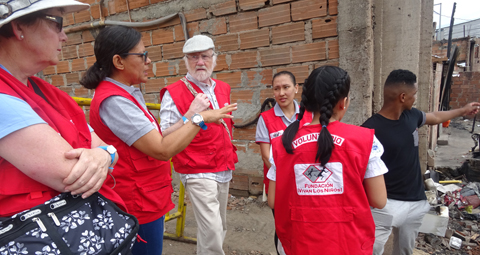BY Ryan McDougall | October 12 | ![]() 0 COMMENTS
0 COMMENTS ![]() print
print

Saving the children from the mean streets of Medellin
Ryan McDougall reveals how a Colombian charity has benefitted from the efforts of a Scottish volunteer
In the shantytowns of Medellin, where drug cartels and crime lords undermine the law, street children face a bleak future of vagrancy, forced prostitution and early, unmarked graves.
Poverty in Colombia’s biggest city, which is polarised, with luscious hotels on one side and hopeless deprivation just over the horizon, is often overlooked by the western world, meaning cries for help from the city’s street kids often fall on deaf ears.
However, Let the Children Live, a small but dedicated UK-based charity, has devoted the last quarter of a century to these destitute children, many of whom are as young as four, fighting to give them an education, food, and to bring them back to a stable home—or, in some cases, give them their first.
In 1992, Fr Peter Walters, then an Anglican minister, took a vacation to Colombia, with the intention of staying until his money ran out. After enjoying his time away from England, his cash ran low, and he decided it was time to book a flight home.
At the airport, he was told he was unable to book a last-minute flight, and would have to wait. Hit with the choice of spending his money on a hotel, or living on the streets and having enough to afford food until his flight, Fr Walters chose the latter.
Street children quickly became aware of the odd British man sharing their sidewalks, but chose to take him in. Touched by their kindness, yet shocked by their living conditions, Fr Walters sought answers.
One evening, he knocked on the local bishop’s door. With his newfound, yet limited, Latin-American Spanish, he asked the bishop if he knew the extent of the deprivation so many of the city’s children faced. The bishop said yes, and that although the Catholic Church was doing what it could to help, the diocese’s money and resources could only stretch so far.
He suggested to Fr Walters that God was calling on him to push for change. That moment would ultimately change Fr Walters’ life forever.
Troubled but enthused by his talk with the bishop, Fr Walters converted to the Catholic Faith shortly after returning to the UK, and subsequently became a priest, with his mission set on helping Medellin’s street children.
In 1992, he founded Let the Children Live, which now runs several programmes dedicated to changing the lives of young street people.
George McAleenan, a long-term friend of Fr Walters and volunteer for Let the Children Live has given 20 years of his life to the cause.
“I worked in the civil service when I started out with the charity in 1998,” he said. “I just thought I’d do what I could to raise a few quid for them, but I didn’t realise that would take me to the streets of Medellin.
“So I got more involved; and then in 2002, I decided to chuck my job and got more involved with the charity. It’s always been on a volunteer basis, and I’ve been back and forward to Colombia about six times to work with the street kids with Fr Peter Walters.”
Mr McAleenan recalled a young man, Johan, whom he had known for the best part of a decade, and who had lived on the streets for most of his life.
Johan was receiving aid from Let the Children Live in the form of food and other support. On one day, someone approached him offering to pay him to deliver a package.
“Johan said yes, no problem, as he needed the money to buy himself food,” Mr McAleenan said. “So Johan and his friends took the parcel to whoever it was for, no questions asked. I don’t know what was in that package, but I’ve got a good idea of what it was—drugs.”
Johan returned to the man and asked for payment.
“The man put his hands in his pocket, pulled out a gun, and shot him,” Mr McAleenan said. “15 years of age. He wanted to come off the streets after all that time—and was shot.”
After hearing the news, Mr McAleenan travelled to Medellin to give Johan a proper funeral.
“Graves are just upturned soil with a stick in it,” he says. “A man took us to his grave, I brought some flowers for him and we eventually bought a wee plaque for it. That wee guy’s now a saint in Heaven. I can now pray to that wee boy and ask him to look down on the street kids that are still alive, and pray for better conditions.”
Thankfully, not all their stories end in tragedy. Another boy helped by Let the Children Live went on to achieve great things through the work of the charity.
“I knew him as Johnny—he collected plastic and rubbish for money to feed himself,” Mr McAleenan said.
“He asked us if he could go to school, and we managed to be able to send him to one. He did well throughout primary and secondary, and then said ‘what’s next?’ and that he wanted to go to university.”
Johnny qualified for one of just 10 scholarships available for some of the best universities in Medellin.
“He studied by candlelight in his shanty house, and was often mocked by other students for his background,” Mr McAleenan said. “Four years ago he became a doctor. I’m so proud of him.”
Let the Children Live has several educational programmes set up for the street kids on Medellin, including Casa Walsingham, which helps those who can’t get a traditional education due to working all day on the streets. The charity has also saved several young women from a life of forced prostitution.
“You don’t see so many girls on the street,” Mr McAleenan explained. “Men will approach them and say, ‘this is no place for a woman, come with me and you’ll get a bed and shelter.’
“But that’s not the case at all, it’s not for sleeping on—it’s for prostitution. Every morning I’d go out and give hot chocolate and rolls to the street kids, and sometimes I’d pass through the red light district and we’d try to rescue these young girls.”
Medellin, on the face of it, has improved over the last 20 years, due to tourist resorts and attractions having been built. This, however, has turned many of the street kids into sewer dwellers, having nowhere else to go.
Mr McAleenan said western media and charities often forget about the city because their focus lies on other places such as Africa and India.
“Don’t get me wrong, it’s great work that they’re doing,” he said. “But whenever I talk to people they’ll say ‘I didn’t know about all that in Colombia.’
“You might have seen films on TV and stuff about this, but at the end of the day it’s a just a flat screen. When you’re there, it’s another world. And small charities like us struggle terribly because of that.
“I’ve cried many times over there when I’ve seen some of the kids and how they’ve had to live. I still ask myself, ‘How do these kids survive?’
“There’s no reason why someone should live in such abject poverty. Especially in Medellin, because it’s a very wealthy place. Education is the exit out of this kind of poverty.”
Reminiscing on the past 20 years with the charity as a volunteer, Mr McAleenan said that despite having so little, the street kids and those living in shantytowns would always share what little they have with him.
“They’d welcome me into their house—no carpets, made of scraps—but they’d still insist on sharing food with me,” he said. “It’s been an absolute pleasure working with them.”
To learn more about Let the Children Live, visit: www.letthechildrenlive.org










